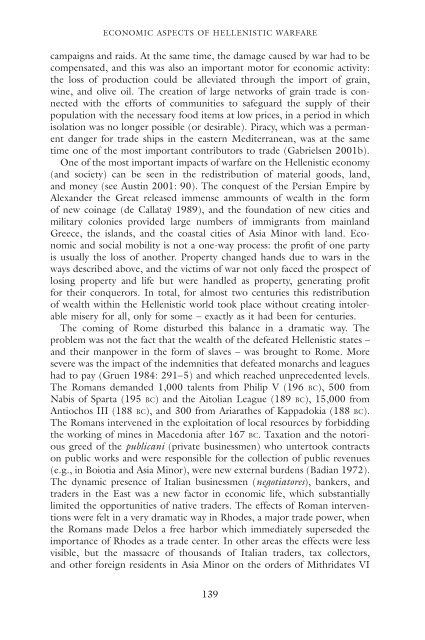WAR IN THE HELLENISTIC WORLD
WAR IN THE HELLENISTIC WORLD
WAR IN THE HELLENISTIC WORLD
Create successful ePaper yourself
Turn your PDF publications into a flip-book with our unique Google optimized e-Paper software.
ECONOMIC ASPECTS OF <strong>HELLENISTIC</strong> <strong>WAR</strong>FARE<br />
campaigns and raids. At the same time, the damage caused by war had to be<br />
compensated, and this was also an important motor for economic activity:<br />
the loss of production could be alleviated through the import of grain,<br />
wine, and olive oil. The creation of large networks of grain trade is connected<br />
with the efforts of communities to safeguard the supply of their<br />
population with the necessary food items at low prices, in a period in which<br />
isolation was no longer possible (or desirable). Piracy, which was a permanent<br />
danger for trade ships in the eastern Mediterranean, was at the same<br />
time one of the most important contributors to trade (Gabrielsen 2001b).<br />
One of the most important impacts of warfare on the Hellenistic economy<br />
(and society) can be seen in the redistribution of material goods, land,<br />
and money (see Austin 2001: 90). The conquest of the Persian Empire by<br />
Alexander the Great released immense ammounts of wealth in the form<br />
of new coinage (de Callataÿ 1989), and the foundation of new cities and<br />
military colonies provided large numbers of immigrants from mainland<br />
Greece, the islands, and the coastal cities of Asia Minor with land. Economic<br />
and social mobility is not a one-way process: the profit of one party<br />
is usually the loss of another. Property changed hands due to wars in the<br />
ways described above, and the victims of war not only faced the prospect of<br />
losing property and life but were handled as property, generating profit<br />
for their conquerors. In total, for almost two centuries this redistribution<br />
of wealth within the Hellenistic world took place without creating intolerable<br />
misery for all, only for some – exactly as it had been for centuries.<br />
The coming of Rome disturbed this balance in a dramatic way. The<br />
problem was not the fact that the wealth of the defeated Hellenistic states –<br />
and their manpower in the form of slaves – was brought to Rome. More<br />
severe was the impact of the indemnities that defeated monarchs and leagues<br />
had to pay (Gruen 1984: 291–5) and which reached unprecedented levels.<br />
The Romans demanded 1,000 talents from Philip V (196 BC), 500 from<br />
Nabis of Sparta (195 BC) and the Aitolian League (189 BC), 15,000 from<br />
Antiochos III (188 BC), and 300 from Ariarathes of Kappadokia (188 BC).<br />
The Romans intervened in the exploitation of local resources by forbidding<br />
the working of mines in Macedonia after 167 BC. Taxation and the notorious<br />
greed of the publicani (private businessmen) who untertook contracts<br />
on public works and were responsible for the collection of public revenues<br />
(e.g., in Boiotia and Asia Minor), were new external burdens (Badian 1972).<br />
The dynamic presence of Italian businessmen (negotiatores), bankers, and<br />
traders in the East was a new factor in economic life, which substantially<br />
limited the opportunities of native traders. The effects of Roman interventions<br />
were felt in a very dramatic way in Rhodes, a major trade power, when<br />
the Romans made Delos a free harbor which immediately superseded the<br />
importance of Rhodes as a trade center. In other areas the effects were less<br />
visible, but the massacre of thousands of Italian traders, tax collectors,<br />
and other foreign residents in Asia Minor on the orders of Mithridates VI<br />
139
















